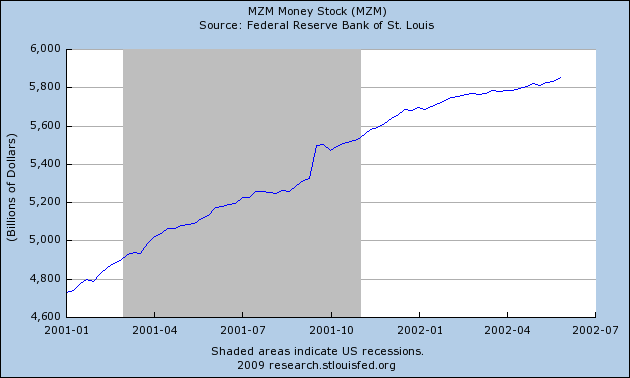The Fed, A Weapon of Monetary Destruction
Economics / Central Banks Dec 21, 2009 - 01:58 AM GMTBy: LewRockwell
 In an extended propagandistic interview in Time magazine, Ben Bernanke is finally asked the crucial question:
In an extended propagandistic interview in Time magazine, Ben Bernanke is finally asked the crucial question:
Q: So, I'm a fringe economics type, I'm not personally, but I'm saying a reader picks up TIME Magazine, and they see this and they go, oh, my God, Ben Bernanke, low interest rates caused this whole thing. He's just an extension of that devil man, Alan Greenspan. Low interest rates, this is the whole cause. What's your bullet answer to that?
A: It's hard to give a bullet answer.
Q: Myth-busters answer.
A: Monetary policy in the early part of this decade was accommodated for good reasons. There was a recession in 2001, there was the jobless recovery, inflation was very low. Keeping interest rates low to get the economy back on track was a reasonable thing to do. I think there are a lot of forces that led to the crisis, a whole range of things were relevant there. I don't think that monetary policy was a particularly important source of the crisis.
By way of review, the Fed has only one distinct power: the capacity to create money out of thin air. In the end, and despite all its other powers, this is the one that matters. So if you are interviewing the Fed governor, one would think that this would be the central question: what did you do with the money-creating power to bring about this situation?
This is not a "fringe concern." This was a central issue in all 19th century debates on money. It was the primary concern before Keynes within the economic profession. The belief that money manipulations spawns booms and busts was the conventional wisdom even into the 1940s. As late as 1973, F.A. Hayek won the Nobel Prize for his work demonstrating the point.
To be sure, what matters is not whether this is a fringe issue but whether it is true. In fact, the point is so true that it is apparently the great taboo issue about which one is never supposed to ask the head of the Fed. We aren't supposed to ask the wizard about any possible downside to his powers.
What's even more interesting is that Bernanke doesn’t quite say that monetary policy didn't cause the boom-bust. What he says is that there were "good reasons" for injecting hallucinogenic drugs into the economic bloodstream. Then he goes on to say that the results were not "particularly important." We are supposed to trust his answer.
At least he does admit that the Fed was "accommodative" – in the same way that the drug dealer accommodates a daily habit. The economy was running on debt, but desperately wanting to cleanse itself of its problem. The Fed intervened to prevent the inevitable. And so the inevitable got worse and came anyway. That's the short history. And from this we can know the future: the next time will be even worse. This is the nature of the state and its affiliated institutions: to learn nothing from mistakes and to screw things up even more the next time.
What about Bernanke's history of the early 2000s? He mentions the recession of 2001 and the "jobless recovery" (what about today's jobless green shoots?). What he doesn't mention, and what very few people have pointed out, is the impact of the attacks of September 11, 2001.
After the World Trade Center and the Pentagon were hit, the mood in Washington was total shock and horror. Bush claimed at the time that he was determined to do whatever it took to show those terrorists that they couldn't hurt our economy. We will be strong in the face of these attacks!
Here is what Bush said immediately after 9/11:
I ask your continued participation and confidence in the American economy. Terrorists attacked a symbol of American prosperity. They did not touch its source. America is successful because of the hard work, and creativity, and enterprise of our people. These were the true strengths of our economy before September 11th, and they are our strengths today.
Of course, Washington doesn't have any magical ability to make the economy strong, to cause prosperity to appear as a way of showing terrorists what's what. The Fed is the only weapon in town for these purposes. And so the Fed went to work for the central state, as it always does. You can see the evidence here.

Now, this action, like everything else the state does, caused unforeseen results. They thought they would create a boom but now we are all paying the price. Osama bin Laden must be laughing. If Washington had done nothing at all after 9/11/01, either in domestic or foreign policy, the world would be much more peaceful and prosperous today.
Llewellyn H. Rockwell, Jr. [send him mail] is founder and chairman of the Ludwig von Mises Institute in Auburn, Alabama, editor of LewRockwell.com, and author, most recently, of The Left, The Right, and The State.
© 2009 Copyright LewRockwell.com - All Rights Reserved
Disclaimer: The above is a matter of opinion provided for general information purposes only and is not intended as investment advice. Information and analysis above are derived from sources and utilising methods believed to be reliable, but we cannot accept responsibility for any losses you may incur as a result of this analysis. Individuals should consult with their personal financial advisors.
© 2005-2022 http://www.MarketOracle.co.uk - The Market Oracle is a FREE Daily Financial Markets Analysis & Forecasting online publication.



